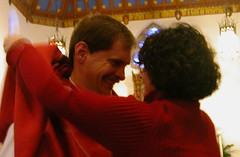Top Five
Bob Carlton has been gently soliciting my participation in his “top five” posts for 2004 project, but I’ve been putting it off (by way of avoiding it altogether — looks like he’s offline for a while, so maybe this is too late). Then yesterday Tripp prodded me to post my top five, and as I wrote back about why I was resisting, I realized how dreadfully self-important I sounded: “I don’t think of my blogs as ‘better’ or ‘best,’ as though they were singles off a series of albums” — thus, as if I were a stuffy rocker whose Art couldn’t be sold by single downloads (though it can be broadcast in singles).
Anyway, I — chastened, humbled — have been trying to figure out which would count as my Top Five. Part of the problem, for me, is that I don’t remember the last year all that well! My final candidates aren’t especially “spiritual,” though they hold some lessons for emergent congregations, I suppose. Counting down from Number Five, I guess they’d be:
Number five might be the post that triggered a complex of ideas that will turn into my Winslow lecture next spring.
Then, for number four, I nominate “Why churches should have websites,” which at the time seemed to me to be just repeating stuff that Jordon et al. had been saying all along, but which caught a lot of attention anyway. If it helped people tune in to the value of putting up even a minimal web presence, then so much the better.
I’ll make number three my response to seeing The Passion of the Christ (and the follow-up “Passion and Postmodernism”).
Number two would be the Lessig Read-a-thon, which was covered by Doug Kaye’s IT Conversations, the Toronto Globe and Mail, and eventually turned into a series here, here whose fruits can most simply be retrieved via the Internet Archive.
And the obvious number one would be the InfoHighwayman series, recounting my [mis]adventures with wireless security law in Nantucket. It all begins here, and continues here, here, here, and here (with the image of the newspaper story here).
There were a bunch of sermons this past year — I don’t have the perspective to pick and cchoose among them for “best”-ness, but I’ll see about making a compendium post later.






